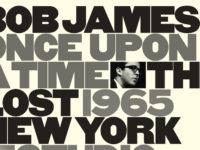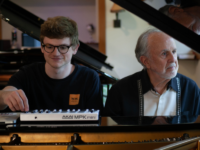by Something Else Reviews
In many ways, television is a technological wonder these days, what with remote controls, digital signals and DVRs. But, for those who fell in love with the old-school opening theme, it’s not all gravy. Today, you’re more likely to simply see the word LOST charging toward the screen, followed by a suitably ominous thud. Cool, sure. But try humming along. Contrast that with some of these crazy-addictive broadcast favorites from yesteryear …
by S. Victor Aaron
Bob James has been a recording artist since way back in 1963. He’s also produced, arranged composed and played keyboard sideman for a buttload of jazz and crossover jazz records in the late 1960s and the first half of the 1970s — including Grover Washington Jr.’s career-defining Mr. Magic.
By 1978 he had even led on five prior jazz-lite albums of his own during this productive time. But Bob James didn’t really become the Smooth Jazz King Bob James until he was commissioned to write and record the theme song for the popular television series Taxi.
Like many jazz or “near-jazz” listeners of that time, this was my first awareness of James, and his softened, non-threatening Fender Rhodes and light use on synthesizers provided a counterpoint to — some would say reprieve from Herbie Hancock’s sometimes heavy-handed funk jazz from around that time.
This is one TV theme song where I’m much more familiar with the full version than the one-minute, heavily edited version you hear during the opening credits. The album cut brings extra treats in the form of Eric Gale’s signature stinging, deeply funky guitar lines. James’ own solo is nothing spectacular (I don’t know if such a thing as a spectacular James solo exists), but a memorable melody, careful production and litany of outstanding supporting musicians like Idris Muhammed, Gary King, Hubert Laws, Ralph McDonald resulted in a made-for-TV tune that’s also suitable for listening on the stereo a few times.
Bob James’ recording career is like one where nearly every at-bat he’s angling for the sure single but once in a while he accidentally scores a in-field home run. He managed to round the bases with “Angela.”
by Nick DeRiso
Everything about this tune plays off its central theme: The jittery, nail-biting harpsichord (representing the fictional fastidiousness of Felix Unger) works in winking counterpoint to an indolent trumpet melody (sounding every bit like the gloriously sloppy Oscar Madison). And that’s not even the best part of this theme, written and performed by Neal Hefti.
No, in my mind, Hefti’s loungy he said/he said song always begins — and must always begin — the way it does on the first and second seasons of TV’s “The Odd Couple,” back in 1970-71: “On November 13, Felix Unger was asked to remove himself from his place of residence,” narrator Bill Woodson intones, as Felix’s spouse slams the door behind him, only to reopen it and pass along a final piece of cookware. “That request … came from his wife.”
Hefti was, by then, best known for his work with Woody Herman, Count Basie and Frank Sinatra. Well, and for composing the theme music for the original Batman cartoon series — a timelessly annoying piece for which the quipster once said he should have been credited for “word and music by Neal Hefti.” He would eventually be nominated twice for a Grammy for his subsequent work on “The Odd Couple,” a multi-platform turn-of-the-1970s juggernaut, before abruptly retiring from music.
by Tom Johnson
At 7 or 8 years old, your parents understandably want you to expand your horizons, they want you exposed to new things. I was even excited, for a time, to be expanding and exposed by taking piano lessons. Early on, it’s hard to realize just how dull the exercises become, practicing scale after scale, up and down, down and up, and then chipping dutifully away at dreck like “Beach Ball Bounce.”
I had grander visions. When not practicing, I attempted to tap out the melody of some Ronnie Milsap song that had caught my ear, but more than that, I really, really wanted to learn “The Greatest American Hero.” That show’s rousing theme song had burrowed into my head and I simply had to play it.
With the doldrum of endlessly repeating scales and “Beach Ball Bounce” wearing me down, my piano teacher made me a deal — make it through and she’d get me the sheet music for “The Greatest American Hero.” Deal! I had pretty much grown to hate playing the piano, but this gave me something work for.
I didn’t know who Joey Scarbury was, and, in fact, didn’t know until I looked it up just now. And most people today probably don’t either. But back then, it was his one real hit, ascending as high as No. 2 on the Billboard charts. It may have been Scarbury singing, but its music is the work of legendary Mike Post. Essentially, if you grew up in the 1970s or 1980s, you’ve heard his handiwork: The Rockford Files, CHiPs, The A-Team, Doogie Howser M.D., MacGyver, Hill Street Blues, Law & Order and many more all owe thanks to Mike Post for their earworm-worthy theme songs. So legendary is he that Pete Townsend honored him in a song on The Who’s most recent album, Endless Wire, “Mike Post Theme.”
Eventually the sheet music was in my hands, the cover deep red and emblazoned with the bumbling superhero’s logo, but … well, that’s where my memory sadly wears thin. Did I ever master it? Did I ever even play it? I have no idea. I gave up piano not too long after this, from what I recall. That piano sat unused, abandoned, in the front room of our house for many years before it disappeared, hauled away by someone else that will either repeat the scenario or will produce someone that truly loves piano. That sheet music, however, has never left my mind. I can still see it sitting in the piano bench, on top of a pile lesson books, songbooks, and staff paper, blazing red, just waiting to be played.
by Mark Saleski
When you hear the Munsters theme song, it’s just so obviously from the early 1960s, combining bright & shiny horn stabs with a surfy, Duane Eddy kind of guitar taking up the melody.
It’s accentuated the campy kind of fun that was so prevalent in comedies of that era (including The Addams Family and Batman). Jack Marshall composed the theme and received a Grammy nomination for it in 1965. He might not have taken home the award, but all of these years later, the song is still remembered.
I must have watched this in its syndicated form because The Munsters ran from the fall of 1964 to the spring of 1966, meaning that I would have been three years old when the series premiered. All I know is that I totally dug the idea of a blue-collar monster family. Yeah, Herman carried a lunchbox just like my dad. OK, so Herman had the cooler car, the DRAG-U-LA. We had a white 1961 Chevy Impala with power everything.
Dang, Rob Zombie never wrote a song about our car.
by Nick DeRiso
“The Streetbeater,” originally released on Quincy Jones’ 1973 A&M recording “You’ve Got It Bad,” would later be featured as part of a subsequent greatest-hits package — despite only reaching No. 294 on the charts.
Not because it was peppered with jazz greats, though it certainly was — from the legendary Ray Brown at the bass to saxophonist Ernie Watts, a longtime band leader who had appeared with Buddy Rich, the Love Unlimited Orchestra and Charlie Haden. Harmonica player Tom Morgan was a former sideman with Henry Mancini, too.
No, it’s inextricably linked to TV’s “Sanford and Son,” a now-endlessly rerun sit-com starring Redd Foxx that aired for six seasons through the late-1970s. To the point where I doubt that anybody can hear this music — an of-its-moment melding of fonky bass harmonica, sizzling organ, sweet-rocking cowbell then boozy horns — and not think of the fictional Sanford’s son Lamont in a beat-up 1950s Ford F-1 pickup, its red paint job now faded to almost pink.
Still, go back to the Quincy Jones original. Try to put that old junkyard out of your head. “Streetbeater” is a stand-alone triumph of soul synthesis, an almost deliriously filthy combination of jazz and alley-way funk. It would have stood the test of time, even wi
thout the help of Fred, Lamont, Aunt Esther, Grady and the rest.
by S. Victor Aaron
The blind, brilliant acoustic guitarist from Puerto Rico is best known for his Latinized version of the Doors’ “Light My Fire” and his own self-penned evergreen yuletide favorite “Feliz Navidad.” However, the first song I think of is his theme song to the mid-1970s sitcom “Chico And The Man.” It’s one of those songs with a wide, cross-ethnic appeal that Feliciano is famous for doing. His sunny outlook pervades this particular song (“there is good in everyone”, “things will get better, I know they will”) as much as his percussive strumming of his acoustic six string.
I only watched the show itself occasionally and none at all after its star Freddie Prinze died, but one scene always stood out. Feliciano himself starred in one episode as Chico’s cousin, later treating Chico and his boss to a live rendition to “Light My Fire.” Soon afterwards, Chico and Ed started quarreling as they often did, but then Feliciano breaks out the theme song while sitting right in between them. As you can predict, that melted their hearts and had them shaking hands by the end of the song. It would just be a typical a slice of sitcom shlock — except that the performer was so good, as was the song. And kind of sad, too, when in hindsight we see the optimism of the tune shattered one January night in 1977 when Prinze put a bullet to his head at the age of 22.
Unlike Feliciano’s take on “Light My Fire,” no one ever made a cover of “Chico,” although Sammy Davis Jr. tried a couple of years later and Spyro Gyra’s “Shaker Song” sounds awfully close to it. Even so, José Feliciano’s voice, guitar and modest accompaniment made a song that created a more lasting impression than the show it was written for. For me, anyway.










